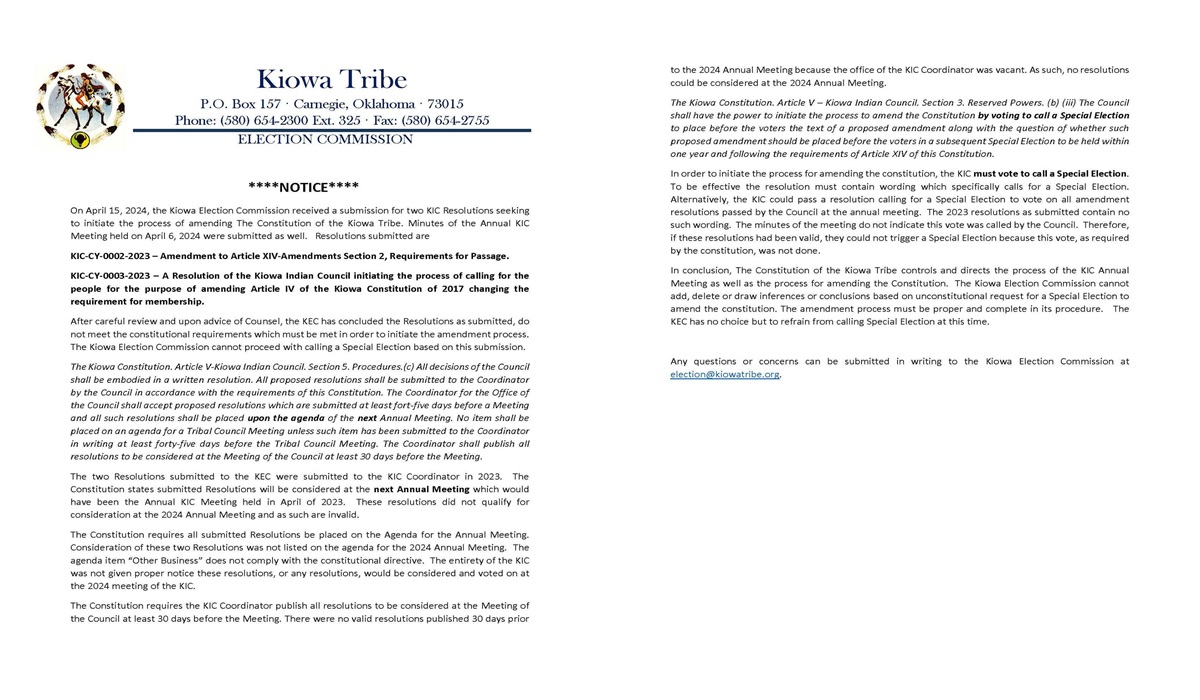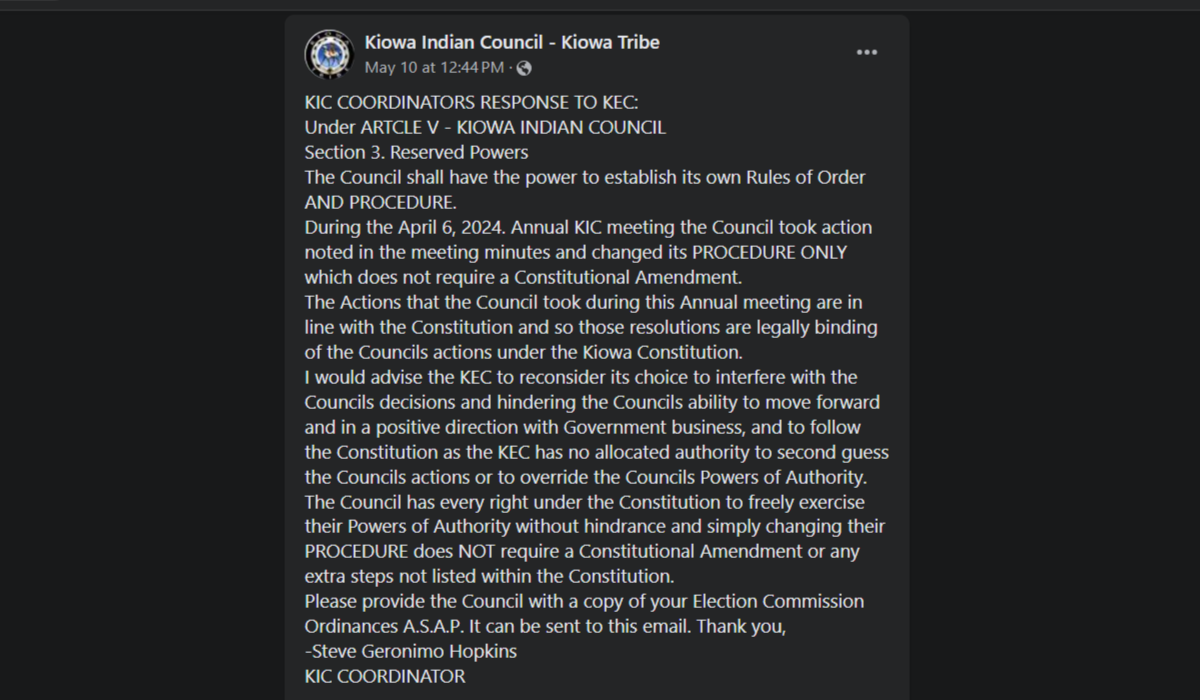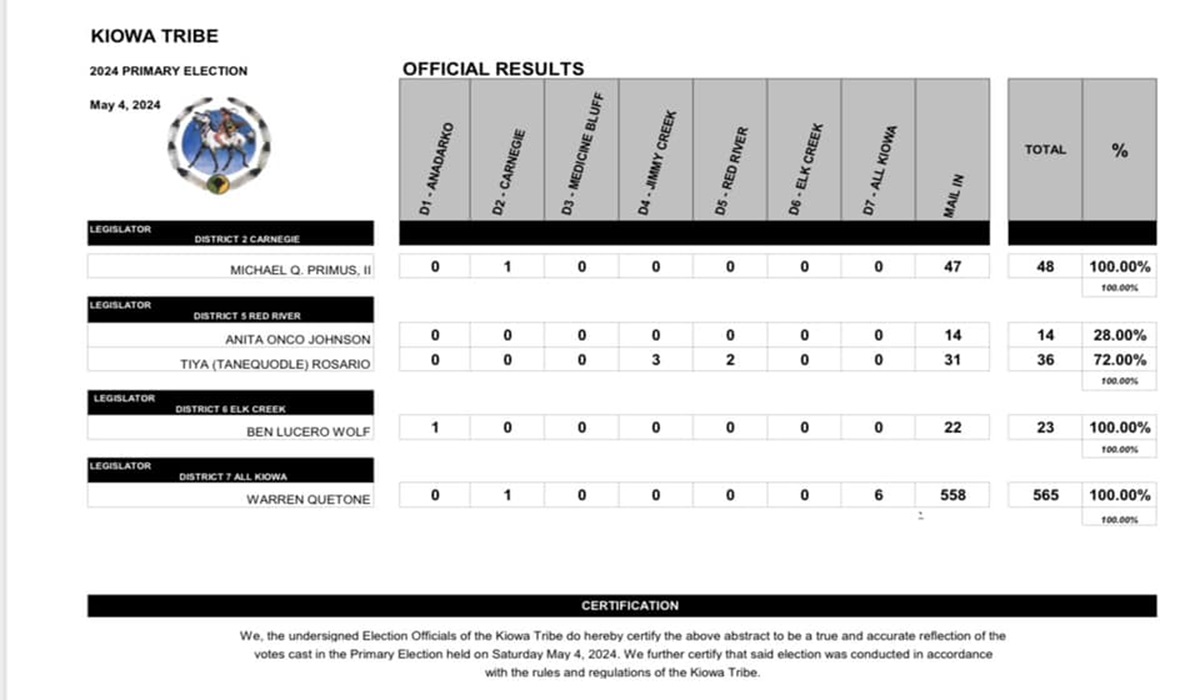
In a controversial move that has drawn criticism and threats of litigation, a pair of proposed constitutional amendments have been stricken from ballots in the Kiowa Tribe’s June 1 election. Both proposals had been approved earlier this year for a vote, and one would have made all members at the time of its passage legally full blood.
The move leaves only the approval of the tribe’s annual budget on the ballot for June 1. While the Kiowa Election Commission has removed all reference to the June 1 election from their website, a Kiowa Election Commission clerk confirmed the budget election is still scheduled for June 1.
The Kiowa Election Commission announced May 10 that ballots for the June 1 election will not include the two proposals, which were approved for a tribe-wide vote at the April meeting of the Kiowa Indian Council. The KIC is the Kiowa Tribe’s fourth branch of government that embodies direct democracy by including all members of the tribe over 18.
Steve Geronimo Hopkins, the KIC’s coordinator, criticized the Kiowa Election Commission’s decision in a Facebook post.
“I would advise the KEC to reconsider its choice to interfere with the council’s decisions and [hinder] the council’s ability to move forward and in a positive direction with government business,” Hopkins wrote on Facebook. “The KEC has no allocated authority to second guess the council’s actions or to override the council’s powers of authority.”
As proposed, Resolution 2 would have required “a majority vote of the eligible voters who vote in the special election” for passage of a constitutional amendment. The amendment would have removed the current requirement that at least 30 percent of eligible voters cast a ballot in a constitutional amendment election for it to be approved with majority support. A similar voter turnout provision in the Cheyenne and Arapaho Tribes Constitution caused multiple constitutional amendments to fail in that tribe’s elections earlier this year.
Resolution 3 would have substantially expanded the pool of people eligible for membership in the Kiowa Tribe by making all members of the tribe at the time of the passage of the amendment legally full blood, or “four-fourths degree,” Kiowa. The measure would have made all current members of the tribe’s biological children and grandchildren eligible for membership in the tribe. However, the measure drew some criticism for potentially excluding the descendants of former members deceased at the time of the amendment’s passage.
According to the Kiowa Election Commission’s announcement posted on the Kiowa Tribe’s Facebook, the commission and unnamed legal counsel reviewed the resolutions and the Kiowa Constitution before determining that “the resolutions as submitted do not meet the constitutional requirements which must be met in order to initiate the amendment process.”
The notice laid out four defects in the KIC’s process of approving the amendments for a vote:
- The proposed amendments were submitted to the KIC coordinator in 2023 and were required to be voted on at the April 2023 KIC meeting;
- The proposed amendments were not properly placed on the agenda for the 2024 KIC meeting; they were improperly placed under the “other business” agenda item;
- The proposed amendments were not published 30 days prior to the meeting; and
- No resolution passed by the KIC in 2024 contains “wording which specifically calls for a special election.”
Lawsuit over rejected constitutional amendments possible

The weekend after the Kiowa Election Commission’s press release was posted, the Kiowa Indian Council – Kiowa Tribe Facebook page, whose only identifiable administrator is Hopkins, posted several statements critical of both the Election Commission and the Kiowa Legislature.
One post accused the Election Commission of “inside terrorism,” although the Kiowa Tribe’s criminal statutes do not appear to include terrorism-related offenses. The post also said the “Election Commission is not immune to being sued and charged with a crime,” without explicitly stating a lawsuit was in the works.
A Mother’s Day post beginning with “BREAKING NEWS!” also accused the Kiowa Legislature of violating the tribe’s constitution by conducting business via Zoom when constitutional provisions require the meetings to take place at the tribal headquarters. The post further alleges all business held over Zoom was “not legal” and therefore void.
“It is a sad time for the Kiowa people, and it will be a task to go back three-plus years to correct the wrongs that have been done to the Kiowa people over that period of time,” Hopkins is quoted as saying in the Mother’s Day post.
With the 2017 Kiowa Constitution creating a judicial branch for the tribe, the final say on the constitutionality of the KIC’s resolutions, the KEC’s power to determine an act of the KIC unconstitutional, and the Kiowa Legislature’s power to authorize Zoom meetings would fall to the tribe’s youngest branch of government.
If Hopkins or another party decides to challenge either the KEC’s decision or the Kiowa Legislature’s alleged use of Zoom, then the dispute’s first stop would likely be the Kiowa Trial Court in front of Chief Judge Heather Mitchell. If filed, the dispute would be the first major constitutional dispute heard by the tribe’s own courts.
While officially created by the 2017 constitution, the process of setting up the Kiowa judiciary proved difficult. Former Chairman Matthew Komalty’s administration delayed implementation, spurring current Chairman Lawrence Spottedbird to promise after his July 2022 election that he would set up a judiciary “as soon as humanly possible.”
Since Spottedbird’s election, several judges — including Chief Justice Eldridge Onco and appellate court justices Melissa Holds the Enemy, Jerilyn Decoteau and Thomas LeClaire — have been appointed, and the courts began hearing cases.
Asked about avenues for settling the current election dispute, Kiowa citizen Joe Poe Jr. mentioned three potential routes: litigation, calling a special meeting of the KIC to reapprove the resolutions or waiting until the next KIC meeting to put the amendments up for a tribe-wide vote again.
KIC, KEC clash over special election procedure

The Kiowa Indian Council meeting of April 2024 was unusual because KIC coordinator Kristi Wolf-Norris had resigned months before the meeting. The coordinator is in charge of publishing an agenda and ensuring the KIC follows constitutional procedures during the meeting. Without a KIC coordinator, the KIC meeting was believed to be limited to electing a replacement coordinator.
“The KIC coordinator coordinates receiving the resolutions to be heard at the annual KIC meeting,” Poe said. “She quit about two months before the meeting, so there was no coordinator to receive the resolutions, and so the agenda for the meeting was only supposed to elect a new KIC coordinator for next year.”
When the April meeting actually kicked off, the KIC decided to act on resolutions that had been approved the year prior, in 2023, with the idea being that notice for the prior year would still be effective this year. While the newly elected KIC coordinator initially believed no resolutions could be heard, Poe said he convinced those at the meeting that the 2023 resolutions had met the 45-day notice requirement by more than a year.
“I went up to the front and I said, ‘But they were (published before the meeting).’ They were given to the KIC coordinator a year and 45 days before the meeting,” Poe said. “So, the resolutions from last year could be heard because they were given timely.”
While Poe’s argument won over the KIC and led to advancement of the resolutions for a tribe-wide vote, the KEC disagreed on the legal analysis and found that KIC resolutions were only valid the year they are submitted and cannot be held over to the next year.
“The constitution requires the KIC coordinator publish all resolutions to be considered at the meeting of the council at least 30 days before the meeting,” the KEC notice reads. “There were no valid resolutions published 30 days prior to the 2024 annual meeting because the office of the KIC coordinator was vacant. As such, no resolutions could be considered at the 2024 annual meeting.”
Follow @NonDocMedia on:
Facebook | X | Text or Email
Primus, Wolf, Quetone win reelection; Rosario unseats Johnson

Members of the Kiowa Tribe elected four people to the Kiowa Legislature on May 4, with incumbents Michael Q. Primus II, Ben Lucero Wolf and Warren Quetone winning reelection after running unopposed.
In the tribe’s contested “Red River” District 5, Tiya “Tanequodle” Rosario garnered 36 votes (72 percent), unseating incumbent Anita Onco Johnson, who received 14 votes (28 percent). Rosario is set to be sworn in on July 15. Voters also approved a modification to the 2023-2024 budget, with 81.9 percent of voters approving the measure.
In the Kiowa general election scheduled for June 1, voters will decide on whether to approve a proposed 2024-2025 budget.





















